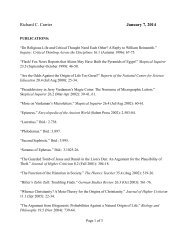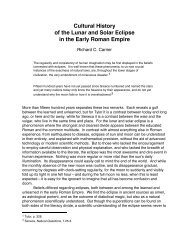“Bayes' Theorem for Beginners: Formal Logic and ... - Richard Carrier
“Bayes' Theorem for Beginners: Formal Logic and ... - Richard Carrier
“Bayes' Theorem for Beginners: Formal Logic and ... - Richard Carrier
You also want an ePaper? Increase the reach of your titles
YUMPU automatically turns print PDFs into web optimized ePapers that Google loves.
have exactly the same effect on P(e|~h.b), which cancels out, so the natural improbability<br />
of such evidence (i.e. the unlikelihood of a trusted colleague just happening to be in a<br />
position to witness the event) can be ignored. Of course, that’s not so if other evidence<br />
makes such a coincidence suspicious (i.e. you have evidence your colleague was set up),<br />
but that’s a much more complex example.<br />
Lesson 2: When there is good evidence <strong>for</strong> a hypothesis, it is ‘good’ simply because it<br />
makes other hypotheses less likely, because those hypotheses have a harder time<br />
explaining how that evidence came about. There<strong>for</strong>e, evidence supporting h lowers the<br />
probability of ~h (more specifically, it lowers the probability of e on ~h). When there is<br />
evidence against a hypothesis, it is ‘against’ it simply because it makes other hypotheses<br />
more likely, because the tested hypothesis has a harder time explaining that evidence than<br />
they do. There<strong>for</strong>e, evidence against h lowers the probability of h (more specifically, it<br />
lowers the probability of e on h). Which also means evidence <strong>for</strong> an alternative<br />
hypothesis is evidence against h, but only if that evidence is relevantly unexpected on h.<br />
If, instead, it is just as predicted by h as by the alternative, then it is no longer evidence<br />
<strong>for</strong> the alternative—it is then inconclusive evidence. Likewise, evidence believed to<br />
support h is also, in fact, inconclusive (<strong>and</strong> thus doesn’t actually support h in any notable<br />
way) if that same evidence is just as likely on an alternative hypothesis (~h).<br />
Fully underst<strong>and</strong>ing both lessons, <strong>and</strong> why they are true, is one of the keys to<br />
underst<strong>and</strong>ing why Bayes’ <strong>Theorem</strong> works <strong>and</strong> how to think like a Bayesian even<br />
without the math. Equally key is a full underst<strong>and</strong>ing of why prior probability is not just<br />
the raw frequency of such things happening (i.e. such things happening as are proposed<br />
by h), but the relative frequency of different explanations of the same evidence.<br />
36<br />
§<br />
Advancing to Increasingly Objective Estimates<br />
This has been a simple example of the mechanics of Bayes’ <strong>Theorem</strong>. In reality you will<br />
want a more in<strong>for</strong>med <strong>and</strong> carefully considered estimate <strong>for</strong> each of the four probability<br />
values that must go into any Bayesian analysis. In other words, the question must be<br />
asked, “How do you get those values? Do you just pull them out of your ass?” In a sense,<br />
yes, but in a more important sense, no.<br />
You aren’t just blindly making up numbers. You have some reason <strong>for</strong> preferring<br />
a low number to a high one, <strong>for</strong> example (or a very low one to one that’s merely<br />
somewhat low, <strong>and</strong> so on), <strong>and</strong> the strength of that reason will be the strength of any<br />
conclusion derived from it—by the weakest link principle, i.e. any conclusion from<br />
Bayes’ <strong>Theorem</strong> will only be as strong as the weakest premise in it (i.e. the least<br />
defensible probability estimate you employ). So to make the conclusions of a Bayesian<br />
analysis stronger, you must make history more scientific, <strong>and</strong> the degree to which you fall








